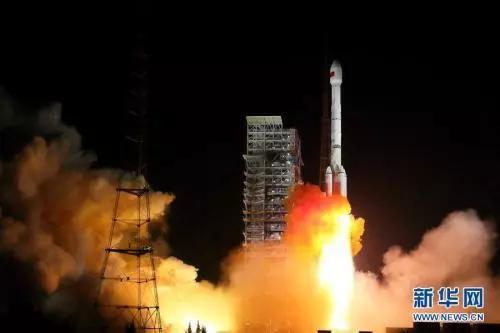
- A
- A
- A
At 19:45 on November 5, China launched the 24th and 25th BeiDou navigation satellites in “two satellites with one rocket” at the Xichang Satellite Launch Center (XSLC) by a Long March 3B/Expedition 1 launch vehicle. These two satellites are China’s first and second network satellites of BeiDou-3, which opens a new era of BeiDou satellite navigation system global networking.

In the next three years, China will usher in a new round of BeiDou network satellite high-density launches. According to the plan, China will fully complete 35 BeiDou-3 satellites networking by 2020, build a global system that is comparable to the United States and surpasses GPS in certain indicators to provide services to the world.
Compared with BeiDou-2 satellite, BeiDou-3 has achieved a number of enhancements in terms of loads, inter-satellite links and laser communications. For example, BeiDou-3 satellite has been equipped with a new generation of atomic clocks: satellite-borne hydrogen atomic clocks, whose accuracy are an order of magnitude higher than the previous BeiDou satellite atomic clocks, and will increase the accuracy of navigation and positioning.
CASIC developed and produced key products such as atomic clocks, SAW filters, batteries, fasteners and connectors in the BeiDou-3 project, and undertook software evaluation and other safeguard works. CASIC attaches great importance to the ancillary products and service support of the BeiDou-3 project. During the mission guarantee period, the party leader of the group company requested that all CASIC participants should further enhance their sense of mission, sense of responsibility, and urgency in fulfilling their tasks, strictly manage quality control, ensure the safety and reliability of all ancillary products, and ensure the successful completion of flight mission, in implementing the spirit of 19th CPC National Congress via practical actions.
In the uplink and downlink signals of BeiDou satellites, the time information is the most important control information and serves as the basis for positioning. The premise of accurate user position information is the high degree of unity of local time of each satellite, while the punctuality device that maintains the accuracy of satellite time is the atomic clock. Therefore, the atomic clock is called the heart of navigation satellites, and it is one of the core signs that a country can independently develop its navigation system capabilities.
No. 203 Institute of 2nd Academy of CASIC provides the BeiDou-3 satellite with high-precision satellite-mounted hydrogen atomic clocks, satellite-borne atomic clocks and other products. Its outstanding product reliability and excellent performance have laid a solid foundation for the precise positioning of the BeiDou satellite navigation system. The institute has provided a large number of space borne atomic clocks for the system, and has “allocated” every BeiDou navigation satellite. At present, the comprehensive data and key indicators of these products have reached the international advanced level and have directly and effectively supported the construction of China’s BeiDou Global Navigation System.
Along with the successful Launch of Long March 3B/Expedition 1 launch vehicle, there were tens of thousands of multi-type aerospace connectors developed and produced by 10th Academy of CASIC. As rocket’s “blood channel”, they have the characteristics of small size, light weight, high degree of serialization, high contact density and excellent anti-vibration performance, and can smoothly and accurately transmit various signal commands to make the rocket movements standardized and accurate.
As for zinc-silver storage battery packs and charge & discharge testing equipment developed and produced by MeiLing Power Supply Co., Ltd. of 10th Academy of CASIC, there were 11 sets of Ancillary products with 10 types in this launch mission. Among them, the zinc-silver battery supplies power to the on-board base-level control system, exterior safety system, remote measurement system equipment, and equipment for the upper-level control system and satellite power supply system; the charge and discharge test equipment provided detection and maintenance for the on-board battery and the upper-level battery.
Tens of thousands of high-performance fasteners produced by Aerospace Precision Products Co. Ltd. are used to link organizations and systems in this task. With the reliable quality and technical support capabilities, each part is connected to an organic whole, building the strong body of rockets and satellites.
As a core component in satellite navigation, SAW filters directly affect the accuracy and operating distance of the navigation system. The SAW filters manufactured by No. 23 Institute of 2nd Academy of CASIC are installed on a satellite receiver to filter various types of noise and clutter in the universe to make satellite communications clearer. The product has served the construction of the BeiDou satellite navigation system for 10 years. Its high-qualified product performance enables the BeiDou satellite in good working condition.
The No. 304 Institute of 3rd Academy of CASIC project team has extended the experience of flight navigation software evaluation and verification technology accumulated in over ten years to the BeiDou project mission. Navigation mission processor, the core component of the navigation, carried out software reliability and security analysis and verification, fully applied the independently-developed semi-physical reliability verification platform, and built 175 navigation processor fault sets, opening up a new model of reliability verification for multi-level analysis, multi-technology integration and fault injection simulation to effectively ensure mission performance. Its related achievements have been listed in the overall plan for BeiDou series satellite results, providing strong support for the reliability and safety of follow-up software of Beidou.
(Reported by Chen Binglong and Cui Enhui)




